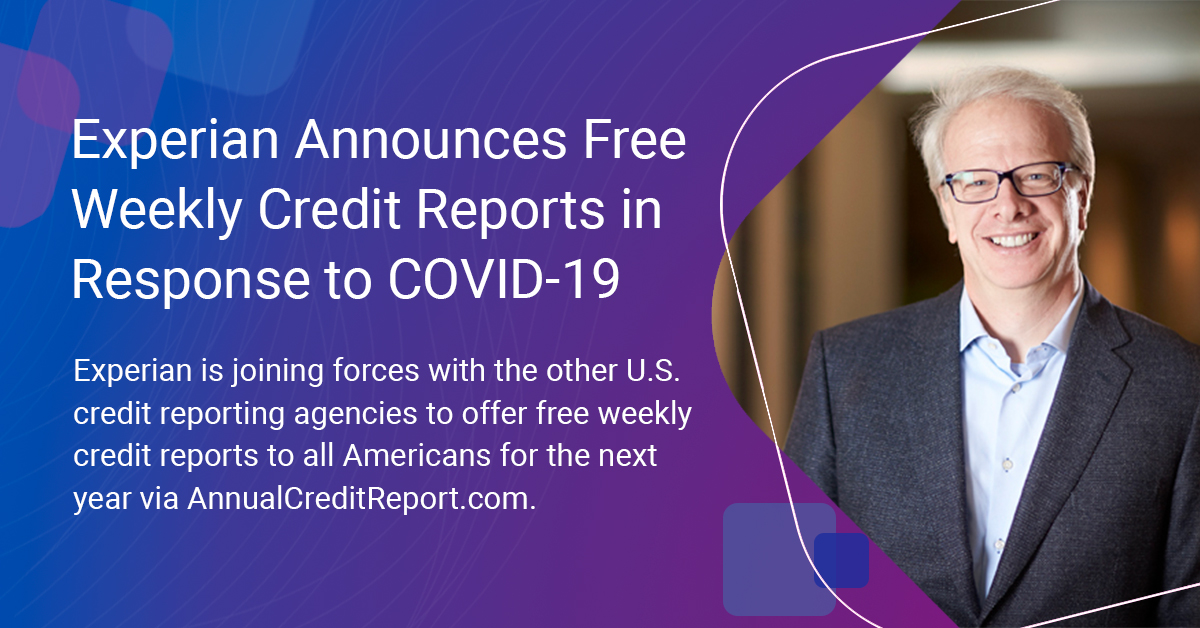
With the impact of COVID-19, we’re certainly in uncharted territory. Many people are struggling with high unemployment, which is resulting in missed credit card, utility, and rent payments. In response, Experian is joining forces with the other U.S. credit reporting agencies, to offer free weekly credit reports to all Americans for the next year via AnnualCreditReport.com. A credit report allows people to monitor their finances and better understand their overall financial health. We’re proud our industry is uniting to make this possible for all U.S. consumers starting today. Credit reports are updated constantly, so the ability for an individual to look at their report weekly is helpful to monitor for lender updates and ensure there is no fraudulent or unfamiliar activity. During these difficult times, this is especially important. In addition to the free weekly credit report at AnnualCreditReport.com, Experian also offers consumers free access to their credit report, FICO score, and ongoing credit monitoring at Experian.com. This is a no-charge product. We want to give consumers multiple options to access and manage their credit report. At Experian, we’re committed to enabling fair and responsible lending through the power of our data. As the consumer’s bureau, our goal is to not only help consumers build credit but to get better access to credit. All of us are working diligently every day to keep our data as accurate, relevant, and secure as possible so that lenders can use the data to responsibly extend credit to people who need it most especially when the economy returns to strength. What You Can Do Now The most vital action someone can take if they are unable to pay a bill is to talk with their lender and inquire about assistance programs that may be available. If a consumer receives an accommodation it will have minimal impact on their credit score if their account is in good standing and if there hasn’t been previous delinquencies reported We remain committed to informing, guiding, and protecting people during these unprecedented times. Beyond our offer for free credit reports, we’ve created a dedicated website, with links to multiple resources and materials to help the community learn about credit and other important personal finance topics. We encourage everyone to visit the Experian COVID-19 Resources & Credit Education. Take care and stay healthy.

The pandemic’s full economic impact is still unfolding, and I can assure you we have not stopped evaluating and evolving our COVID-19 response nor our thinking about economic recovery for consumers and businesses alike. In the last month, we’ve been driven by two major priorities. The first is the health and safety of our employees. On top of that, we have placed a laser focus on putting our resources to work to help people and businesses during these uncertain times. While we have all been adjusting to our ‘new normal’ working environment, our employees in North America have not slowed down. In fact, they have worked hard to create solutions and tools designed specifically to help people successfully navigate the evolving financial landscape. From free credit reports to complementary ‘payer alerts’ for healthcare organizations to consumer credit education, we’ve launched a wide-range of initiatives. Here are a few highlights I’d like to share with you: FOR CONSUMERS: Experian Credit Report and Score: Consumers can sign up and access their FICO® Score, Experian credit report, and ongoing credit monitoring through Experian’s free CreditWorks product. Consumers can also sign up to Experian Boost, a free financial tool that has helped more than 2 million consumers increase their credit score. Consumer Resources Website: As the consumer's credit bureau, Experian’s commitment is to inform, guide and protect its consumers and customers during uncertain times. One way the company is doing this is through this dedicated website, with links to multiple resources and materials to help the community learn about credit and other important personal finance topics. COVID-19 and Your Credit Report: Being fully committed to helping consumers and lenders during this unprecedented period, Experian has created this dedicated blog page with ongoing and updated information pertaining to how COVID-19 may impact consumers’ creditworthiness and – ultimately – what people should do to preserve it. The blog will be updated with relevant news as Experian announces new solutions and tactics. #CreditChat: In response to the urgent and rapid changes associated with COVID-19, Experian is accelerating and enhancing its financial education programming to help consumers protect their financial health. With expected delays in bill payments, unprecedented layoffs, hiring freezes and related hardships, Experian seeks to aid consumers in understanding how the credit reporting system and personal finance overall will move forward in this landscape. Experian has launched an eight-week series of #CreditChat conversations surrounding COVID-19 on Wednesdays at 3 pm ET on Twitter and live video credit chats every Friday at 12:30 pm ET on Facebook Live. FOR BUSINESSES: Free Experian Business Credit Report: Experian is offering all American-owned small businesses free access to their Experian business credit report through May 1, 2020, to help small business owners impacted by the COVID-19 pandemic. By accessing a free business credit report now, small business owners can understand where their credit score stands and look for the best lending options for their business before they obtain funding. COVID-19 U.S. Business Risk Index: To further help small businesses gain access to capital they need, Experian launched its free COVID-19 U.S. Business Risk Index to assist lenders and government organizations in understanding how to make lending options available to the business segments that need it the most. This new risk index can help business risk professionals better understand the impact that the pandemic may have on commercial operations based on several key factors. This methodology combines business risk, anticipated impact on business industries and real-time COVID-19 case data to help businesses better simulate various impact scenarios down to the state level to help develop relevant strategies. Experian® Health Payer Policy Alerts: This is a free comprehensive list of COVID-19 and telehealth payer policy alerts for United States hospitals, medical groups, pharmacies and specialty healthcare service organizations. Payer policy alerts are provided by commercial, Medicare and Medicaid payers and summarize changes to medical coverage policies from those organizations. This public service to the healthcare community will continue to be updated and remain free as long as alerts related to the COVID-19 pandemic continue to be distributed. At-Risk Audiences: In an effort to help essential organizations, such as healthcare and government agencies, provide resources to those most in need during the COVID-19 pandemic, Experian is leveraging its data assets, free of charge, to identify groups of individuals that are most likely to be impacted. Experian developed new audience segments that are built in a privacy-compliant manner and designed to help these organizations find and communicate with at-risk populations, enabling them to deliver essential services as quickly as possible. Business Resources Website: This newly launched website was developed to help businesses prepare to manage increased attacks, continue to push toward digital banking, and understand regulatory changes as businesses find their footing in this evolving financial services landscape. FOR COMMUNITIES IN NEED: First Responders First: Experian North America is supporting first responder workers by donating funds for personal protective equipment (PPE) to COVID-19 for hotspots in New York City and New Orleans through the nonprofit organization, First Responders First. These funds will provide essential supplies, equipment and resources such as masks, gowns, gloves and more to those on the frontline. Heart of Experian Giving Opportunity: Experian is leading this effort in which employees can assist by making a donation to First Responders First through Experian’s Heart of Experian giving opportunity. Experian will match employee donations up to the annual limit of $500 per employee, while funds last. This donation is the latest support the company has provided to help minimize exposure for those most at risk. For example, in California, the company also donated 12,000 masks to the Hoag Medical Group. I’m proud of the work we’re doing at Experian to help those impacted by this crisis. We remain dedicated to our employees, consumers, businesses and communities – and we will continue to innovate and develop new offerings to help those in need. Craig Boundy CEO, Experian North America

As I reflect on the impact COVID-19 has had on my work and family life, I’m reminded of the things I once took for granted. My day-to-day routine has evolved into one of working from home, helping to take care of my toddler, and at times, doing so while on conference calls, sorting out the next grocery delivery, and writing this blog. While it’s a challenge, I’ve come to appreciate and value many of the things I’ve once taken for granted. But I also understand, I’m not the only person experiencing change. Across the globe, lives have been upended. The impact of the COVID-19 outbreak has been far-reaching and felt by hundreds of millions of people; whether due to family members that have fallen ill, job loss, shortened working hours or their children out of school. COVID-19 is an existential challenge that no one industry or entity can single-handedly address; we all need to play our part. Some companies, such as Fanatics, Ford, General Motors and Tesla, have shifted production efforts to focus on manufacturing medical resources, including personal protective equipment and ventilators. Others are donating free meals and resources to help consumers across the globe manage during this unprecedented time. Much like these organizations, Experian is committed to helping consumers and businesses navigate our current environment. We’ve expanded our financial education programming with the goal of helping consumers maintain good credit and protect their financial health. We’ve also offered small businesses free access to their Experian business credit report to help them better gauge their financial options and understand what capital is available to them. But as the world continues to combat the pandemic, we, like others, must look for new and additional ways to help. As essential organizations extend outreach efforts for those impacted by the outbreak, we believe data and technology can help them identify the groups that are most at-risk. With finite resources and limited bandwidth, it’s important for these organizations to communicate with at-risk populations and provide essential products and services as quickly as possible. With this urgency in mind, Experian developed At-Risk audience segments, which it is making available free of charge to essential organizations, such as government agencies, healthcare providers and non-governmental organizations, to help combat the fallout of the COVID-19 outbreak. The segments are built in a privacy-compliant manner and provide insights to help essential organizations reach those most in need. Organizations can use the information to determine where to allocate emergency funds, as well as redirect healthcare resources. Because the situation associated with the pandemic is changing seemingly every day and is impacting individuals in different ways and times, we also instituted a daily survey of the general population to gain insights around shifting consumer sentiment as a result of COVID-19. The insights from the survey will help organizations understand consumer sentiment during this difficult time and begin the process to identify at-risk populations. As of April 8, 2020, the survey found that: 73 percent of Baby Boomers are concerned about visiting the doctor and/or would hold off seeking care. 60 percent of Americans are concerned about filling prescriptions and/or accessing healthcare resources. 64 percent of Americans are concerned about their ability to access food and other essentials. COVID-19 has impacted consumers and businesses across the globe. As we all adapt to the new environment, we need to work together and collaborate to find ways to combat the fallout. Experian will not be stopping here, and we are committed to developing new ways to use our resources, data, technology, and creativity to help be part of the solution.

Recently, I had the privilege to serve on a panel during a joint workshop held by the Consumer Financial Protection Agency (CFPB) and the Federal Trade Commission (FTC) to examine the accuracy of credit reports and how to best serve consumers. During the workshop and in following written comments, I shared Experian’s commitment to advance accuracy in consumer credit information and our perspective on how the current regulatory environment supports our efforts to achieve continual improvements. At the workshop, we heard concerns about how inaccuracies in credit reports can impact consumers and businesses in terms of denial of credit or higher-priced credit. For Experian, these are real concerns. Our role as a credit reporting agency is to help facilitate fair and affordable credit to consumers and small businesses, and that’s why data accuracy is mission-critical and central to our corporate values. Since the workshop was held in Washington, DC, it’s no surprise that many stakeholders turned to the topic of reforming the existing regulatory system. Some stakeholders focused on making systemic changes in law and regulation, such as by setting very strict matching standards when credit bureaus receive and issue credit reports. But experience shows us that the current legal and regulatory standards are, indeed, appropriate and we don’t need a sledgehammer to hit a nail. Such actions would have unintended negative consequences and are unnecessary when all stakeholders share the goal of ensuring access to credit. In fact, the central theme I reinforced at the workshop was that the CFPB’s existing supervisory and examination authority, combined with market demand, industry investment and consumer expectations are the most effective ways to continually improve accuracy of credit reports. Let me explain how my over 30 years of experience with Experian leads me to this conclusion. Consumer reporting agencies, like Experian, are regulated by the Federal Fair Credit Reporting Act (FCRA). The FCRA requires that consumer reporting agencies “follow reasonable procedures to assure maximum possible accuracy” when assembling credit reports. Notably, this standard does not set an accuracy rate but appropriately recognizes the complexity brought about by a system with thousands of stakeholders (lenders, users of credit reports, and credit reporting companies reporting billions of pieces of information on hundreds of millions of consumers). It’s been more than eight years since we last saw comprehensive studies to determine the accuracy of credit reports. The two most cited are reports from the Policy and Economic Research Council (“PERC”) and FTC. One of the key findings in both studies was the percentage of consumers that were impacted by material errors in their credit report. In other words, errors that resulted in credit score changes that impacted the interest rate a consumer would pay on a loan. Both studies found that a small percentage of credit reports, 0.5% in the PERC Study and 2.2% in the FTC report, had material errors. While the percentages do represent many consumers (a minimum of 2.5 million to 4.4 million consumers) they also highlight the important need for continuous improvement so that material and consequential errors are the focus of innovation in data integrity. We don’t need to throw the baby out with the bathwater, we need to hone in on targeted and discrete changes. That’s my job at Experian, and I’m passionate about it. In addition to the “maximum possible accuracy” standard, market incentives provide another powerful mechanism to ensure improved data accuracy. Users of credit reports – ranging from banks to employers to government agencies – rely on accurate data to make critical decisions every day about loans, employment access, government benefits, and other important matters. Lenders need accurate data to perform sound risk assessments and provide terms tailored to the borrower’s appropriate risk level. As a result, credit reporting agencies compete to have the most reliable and accurate data. The same is true of lenders reporting data on their customers, as they have incentives to maintain good consumer relationships. Further, if inaccurate data is reported by a lender or maintained by a credit reporting agency, we all spend more time responding to consumer disputes instead of investing in new products and services to help consumers. It’s easy to see why inaccurate data just isn’t good for business! Since the FTC and PERC accuracy studies were completed, the regulatory environment for credit reporting has drastically changed. In 2012, the CFPB began to supervise and examine the credit reporting industry. This regulatory authority allows the CFPB to see the entire credit ecosystem that is composed of not only credit bureaus, but also lenders, other users of credit reports, and entities that furnish data to credit bureaus. CFPB’s comprehensive and continuous examination procedures include directly reviewing the policies, procedures, and practices of major credit reporting agencies. These steps include reviewing how data furnishers are screened, steps taken to minimize the likelihood of incorrect information on a report, measures to prevent duplicative information, and any programs designed to assess the accuracy of consumer information. These actions allow the CFPB to understand the metrics of accuracy and how it improves over time, and to apply the FCRA on a dynamic basis that can meet any challenges unforeseen when the law was originally passed. The CFPB’s supervisory authority thus serves as a powerful tool to holistically address data accuracy. In a 2017 supervisory report, the CFPB stated that “Credit reporting agencies have made significant advances to promote greater accuracy, the oversight of furnishers, and enhancements to the dispute resolution function.” It’s also important that there are ongoing discussions among the credit bureaus about how to move accuracy forward. To that end, joint efforts by the credit reporting agencies pursuant to an agreement with a group of state attorneys general, resulted in a joint working group to look at what can be done collectively to agree on improvements to accuracy. Recent changes include the delayed reporting of medical debt to allow time for insurance to process payments, and the removal of judgment and tax lien information, which did not meet new, elevated standards. The joint working group continues to explore new ways of increasing the accuracy of credit data. A broad, flexible, yet demanding legal structure, combined with strong market incentives and a robust and effective supervisory program, all work together to foster an environment to best serve consumers. As the consumer’s bureau, Experian is committed to playing a leading role in furthering a strong and accurate credit reporting system.

As I sit here on the day of the launch of the most comprehensive small business stimulus program in our nation’s history in response to the COVID-19 pandemic, my mind turns to the small business owners. Starting today, business owners can start applying for loans that are forgivable under the Small Business Administration’s $350 billion Paycheck Protection Program as long as those businesses maintain payroll to most of their staff and use the funds for eligible expenses. You’ve heard that small businesses are the heartbeat of the U.S. economy, the statistics back that up – small business represents a 47% of all employees and generate 43.5% of the Gross Domestic Product (GDP). More than their contributions to our economy, small business owners and their employees are the pillars of our communities, providing products, services, entertainment, and more. After the last few weeks, I think we can all appreciate the role small business plays in each of our lives. We, at Experian, take our purpose very seriously – creating a better tomorrow by creating opportunities for businesses to succeed. One thing we can count on in America is that small business owners rise to a challenge, it’s in the foundation of this great nation. Small business owners have the passion, fortitude, and downright grit to take them through the most challenging times – this time will be no exception. But I also know that now and then a little help is needed, and right now we need to help small business owners who are dealing with the immediate implications of the COVID-19 pandemic. Beginning today, an unprecedented level of government support will be made available through the Small Business Administration and other government bodies. At Experian, we applaud the signing of the Coronavirus Aid, Relief, and Economic Security Act (CARES Act) as it’s a great step toward economic recovery. The CARES Act provides grants and loans to small businesses with an unprecedented loan forgiveness program. We also feel an obligation to do our part to ensure that small businesses, who are dealing with the immediate implications of this economic crisis, have additional resources at their disposal to make informed decisions at this critical time. That’s why I’m proud to share that we have made available to every small business in the United States free access to their Experian Business Credit report until May 1st. Small business owners can get their reports at www.freecompanycredit.com. We also feel a deep obligation to our clients, the lenders, trade creditors, utilities, insurance underwriters, and more as they strive to support small businesses during this time. To further help small businesses gain access to capital they need, Experian also launched its free COVID-19 U.S. Business Risk Index to assist lenders and government organizations in understanding how to make lending options available to the business segments that need it the most. This new risk index can help business risk professionals better understand the impact that the pandemic may have on commercial operations based on several key factors. We also hope that our data and advanced analytics enable our clients to offer fair and responsible lending to small businesses that need it most during this time. I’ll close by urging the small business community to please take advantage of accessing your free Experian business credit report while continuing to show the grit and innovative spirit that has helped make America the most robust economy in the world. I’ll leave you with one of my favorite quotes, from Arianna Huffington, “Fearlessness is not the absence of fear. It’s the mastery of fear. It’s about getting up one more time than we fall down.” Sincerely, Hiq Lee

These unprecedented times call for unprecedented measures. Experian supports the signing of the Coronavirus Aid, Relief, and Economic Security Act (CARES Act). We are encouraged by this historic effort to protect consumers and businesses alike. The relief bill is a great step toward economic recovery, directly supporting Americans through expanded unemployment coverage and by providing grants and loans to small businesses. At Experian, we have an unwavering commitment to help consumers and clients manage through this unprecedented period. We are actively working with financial institutions, lawmakers and regulators on tools and initiatives to protect consumers from potential adverse consequences to credit reports and credit scores as a result of financial hardship caused by the COVID-19 outbreak. Additionally, we remain focused on ensuring data integrity as we lead industry initiatives to provide financial institutions methods to clearly identify consumer accounts that are subject to financial hardship as a result of COVID-19 and ensure that such information is properly reflected in credit reports and scores. We’ve built a culture of continuous innovation at Experian, from the way we work to the solutions we create. This has formed a workplace where our teams across the world have a sense of purpose, with a collective desire to help change the lives of millions for the better. Now, more than ever, this is a crucial role we play as we work to create innovative solutions and tools for consumers and businesses to successfully navigate this evolving financial landscape moving forward. Our support of the CARES Act is just one step of many, as we support consumers and customers alike to help bolster the financial ecosystem.


